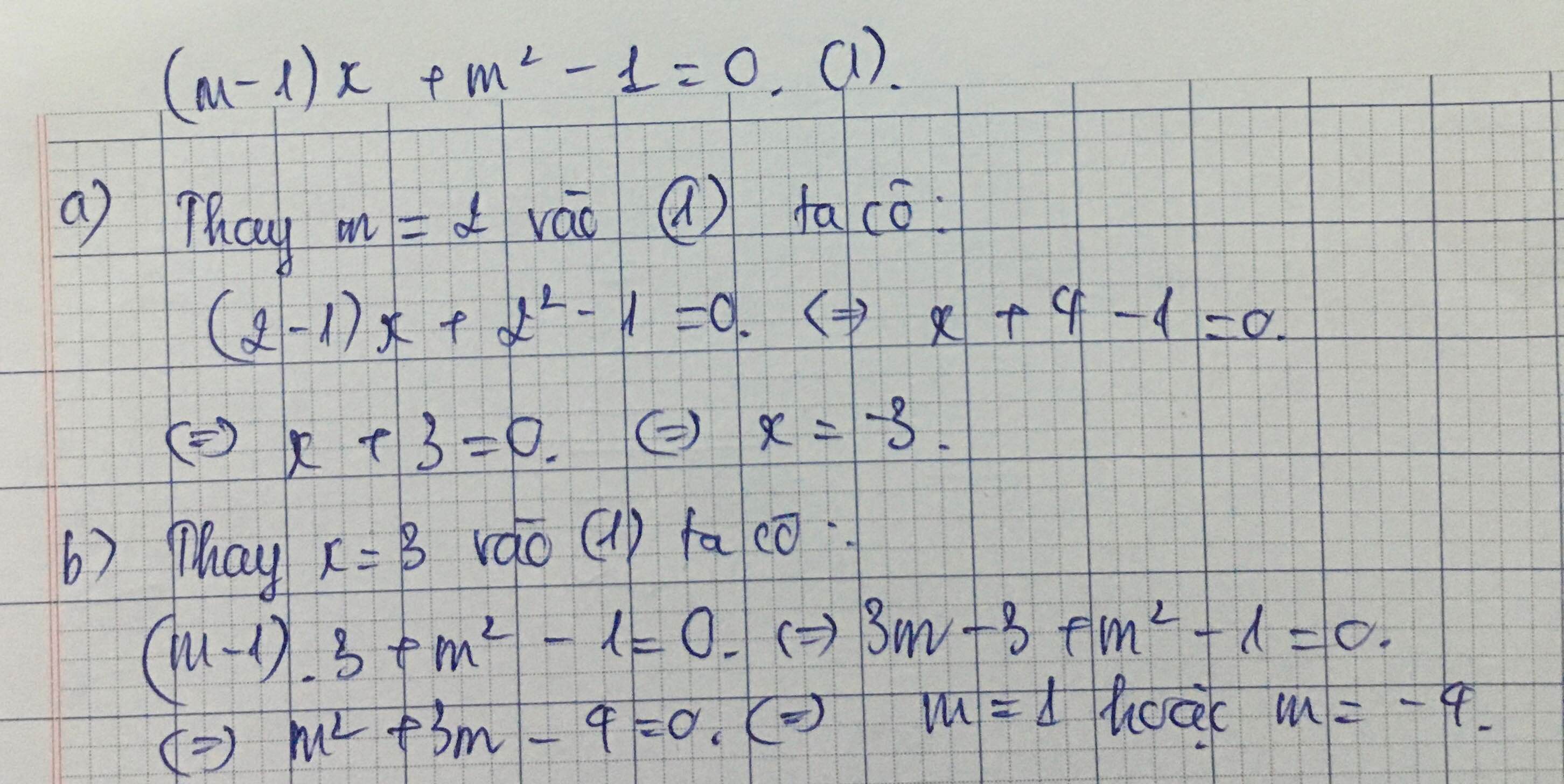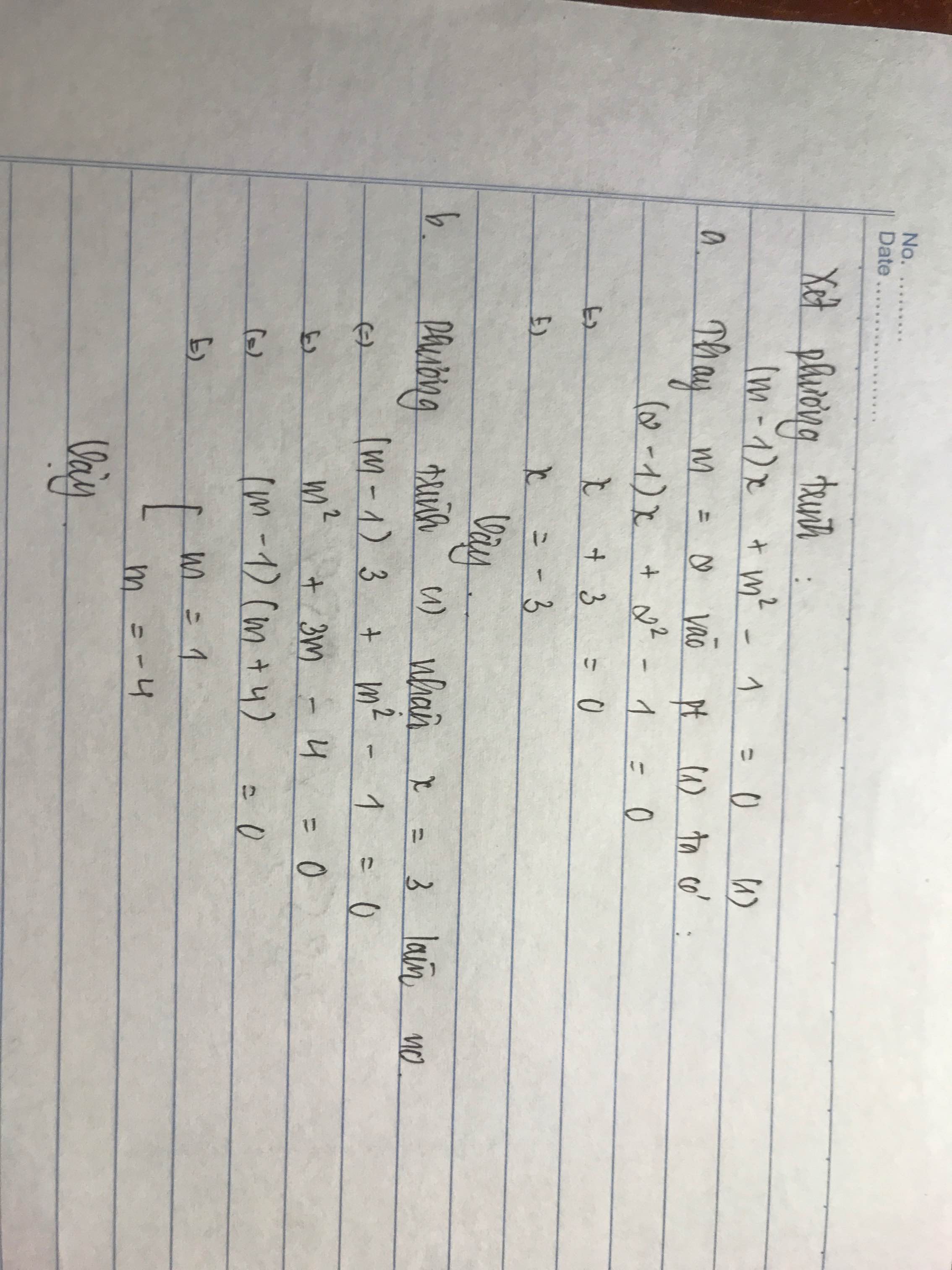Giai phuong trinh :0.5x+2.4=0
Hãy nhập câu hỏi của bạn vào đây, nếu là tài khoản VIP, bạn sẽ được ưu tiên trả lời.


\(\Leftrightarrow\left(b-2\sqrt{2}\right)\left(b+2\sqrt{2}\right)\ge0\\ \Leftrightarrow\left[{}\begin{matrix}b\ge2\sqrt{2}\\b\le-2\sqrt{2}\end{matrix}\right.\)

a) Thay m=2 vào phương trình \(x^2+2\left(m-1\right)x-4m=0\), ta được:
\(x^2+2\cdot\left(2-1\right)x-4\cdot2=0\)
\(\Leftrightarrow x^2+2x-8=0\)(1)
\(\Delta=b^2-4ac=2^2-4\cdot1\cdot\left(-8\right)=4+32=36\)
Vì \(\Delta>0\) nên phương trình (1) có hai nghiệm phân biệt là:
\(\left\{{}\begin{matrix}x_1=\dfrac{-b-\sqrt{\Delta}}{2a}\\x_2=\dfrac{-b+\sqrt{\Delta}}{2a}\end{matrix}\right.\Leftrightarrow\left\{{}\begin{matrix}x_1=\dfrac{-2-\sqrt{36}}{2\cdot1}=\dfrac{-2-6}{2}=-4\\x_2=\dfrac{-2+\sqrt{36}}{2\cdot1}=\dfrac{-2+6}{2}=2\end{matrix}\right.\)
Vậy: Khi m=2 thì phương trình \(x^2+2\left(m-1\right)x-4m=0\) có hai nghiệm phân biệt là \(x_1=-4;x_2=2\)
b) Ta có: \(x^2+2\left(m-1\right)x-4m=0\)
\(\Delta=\left[2\left(m-1\right)\right]^2-4\cdot1\cdot\left(-4\right)\)
\(\Leftrightarrow\Delta=\left(2m-2\right)^2+16>0\forall m\)
\(\forall m\) thì phương trình \(x^2+2\left(m-1\right)x-4m=0\) luôn có hai nghiệm phân biệt là:
\(\left\{{}\begin{matrix}x_1=\dfrac{-\left(2m-2\right)-\sqrt{\Delta}}{2}\\x_2=\dfrac{-\left(2m-2\right)+\sqrt{\Delta}}{2}\end{matrix}\right.\Leftrightarrow\left\{{}\begin{matrix}x_1=\dfrac{-2m+2-\sqrt{\left(2m-2\right)^2+16}}{2}\\x_2=\dfrac{-2m+2+\sqrt{\left(2m-2\right)^2+16}}{2}\end{matrix}\right.\)
Để x1 và x2 là hai số đối nhau thì \(x_1+x_2=0\)
\(\Leftrightarrow\dfrac{-2m+2-\sqrt{\left(2m-2\right)^2+16}}{2}+\dfrac{-2m+2+\sqrt{\left(2m-2\right)^2+16}}{2}=0\)
\(\Leftrightarrow-2m+2-2m+2=0\)
\(\Leftrightarrow-4m+4=0\)
\(\Leftrightarrow-4m=-4\)
hay m=1
Vậy: Khi m=1 thì phương trình \(x^2+2\left(m-1\right)x-4m=0\) có hai nghiệm phân biệt x1 và x2 thỏa mãn x1 và x2 là hai số đối nhau
a, Với m = 2 (1)<=>x^2+2x-8=0 rồi tính ra thôi
b, Để PT có 2 nghiệm PB thì
Δ=[2(m−1)]^2−4⋅1⋅(−4)Δ=[2(m−1)]2−4⋅1⋅(−4)
⇔Δ=(2m−2)^2+16>0∀m
Vì x1 và x2 là 2 số đối nhau nên x1+x2=0 <=> -2(m-1) = 0 <=> m=1
Vậy để PT có 2 nghiệm pbiet đối nhau thì m = 1

Lời giải:
$\cos 2x+\cos x+1=0$
$\Leftrightarrow 2\cos ^2x-1+\cos x+1=0$
$\Leftrightarrow 2\cos ^2x+\cos x=0$
$\Leftrightarrow \cos x(2\cos x+1)=0$
$\Leftrightarrow \cos x=0$ hoặc $\cos x=-\frac{1}{2}$
Nếu $\cos x=0$
$\Rightarrow x=\frac{\pi}{2}+k\pi$ với $k$ nguyên.
Nếu $\cos x=-\frac{1}{2}$
$\Leftrightarrow x=\frac{2}{3}\pi +2k\pi$ hoặc $x=-\frac{2}{3}\pi +2k\pi$ với $k$ nguyên bất kỳ.

a)thay k=0, ta có
\(4x^2-25+0^2+4.0.x=0\)
\(\Leftrightarrow4x^2-25+0+0=0\)
\(\Leftrightarrow4x^2-25=0\)
\(\Leftrightarrow\left(2x-5\right)\left(2x+5\right)=0\)
\(\Leftrightarrow\hept{\begin{cases}2x-5=0\\2x+5=0\end{cases}}\)
\(\Leftrightarrow\hept{\begin{cases}x=\frac{5}{2}\\x=-\frac{5}{2}\end{cases}}\)
Vậy tập nghiệm của PT là \(S=\left\{\frac{5}{2};-\frac{5}{2}\right\}\)
b) Thay k=-3, ta có:
\(4x^2-25+\left(-3\right)^2+4\left(-3\right)x=0\)
\(\Leftrightarrow4x^2-25+9-12x=0\)
\(\Leftrightarrow4x^2-16-12x=0\)
\(\Leftrightarrow4x^2-16+4x-16x=0\)
\(\Leftrightarrow\left(4x^2+4x\right)-\left(16x+16\right)=0\)
\(\Leftrightarrow4x\left(x+1\right)-16\left(x+1\right)=0\)
\(\Leftrightarrow\left(x+1\right)\left(4x-16\right)=0\)
\(\Leftrightarrow\hept{\begin{cases}x+1=0\\4x-16=0\end{cases}}\)
\(\Leftrightarrow\hept{\begin{cases}x=-1\\x=4\end{cases}}\)
Vậy tập nghiệm của PT là \(S=\left\{-1;4\right\}\)
c) Thay x=-2, ta có:
\(4\left(-2\right)^2-25+k^2+4\left(-2\right)k=0\)
\(\Leftrightarrow16-25+k^2-8k=0\)
\(\Leftrightarrow-9+k^2-8k=0\)
\(\Leftrightarrow-9+k^2+k-9k=0\)
\(\Leftrightarrow\left(k^2+k\right)-\left(9k+9\right)=0\)
\(\Leftrightarrow k\left(k+1\right)-9\left(k+1\right)=0\)
\(\Leftrightarrow\left(k+1\right)\left(k-9\right)=0\)
\(\Leftrightarrow\hept{\begin{cases}k+1=0\\k-9=0\end{cases}}\)
\(\Leftrightarrow\hept{\begin{cases}k=-1\\k=9\end{cases}}\)
Vậy tập nghiệm của PT là \(S=\left\{-1;9\right\}\)

x3 - 7x + 6 = x3 - x - 6x + 6 = 0
⇔ x(x2 - 1) - 6(x - 1) = 0
⇔ x(x - 1)(x + 1) - 6(x - 1) = 0
⇔ (x - 1)(x2 + x - 6) = 0
⇔ (x - 1)(x - 2)(x + 3) = 0
\(\text{⇔}\left[{}\begin{matrix}x-1=0\\x-2=0\\x+3=0\end{matrix}\right.\)
\(\text{⇔}\left[{}\begin{matrix}x=1\\x=2\\x=-3\end{matrix}\right.\)
Vậy phương trình có tập nghiệm là S = {1;2;-3}
Chúc bạn học tốt@@




=> 0.5x = -2.4
=> x = -2.4 : 0.5
=> x = -4.8
0,5x+2.4=0
0,5x+2=4
0,5x+0,5*4= 4
0,5(x+4)=4
x+4 = 4:0,5
x+4=8
x=4